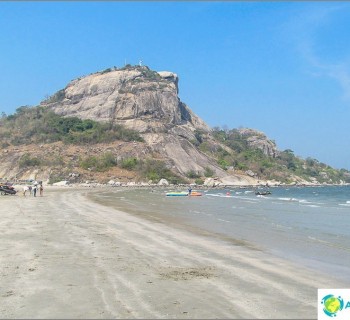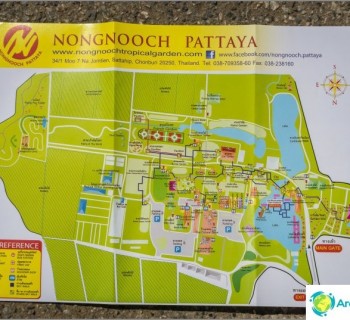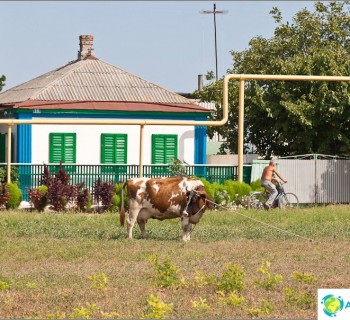I thought to start with the minuses, but let there be pluses first, so that the minuses seem less serious or something 🙂 No, no, I'm not afraid, I just tried to write down everything that caught my eye personally in the first month, both good and bad ... After all, I am in Israel for the first time and the impressions are the most acute now. Well, you know, when you come to the country for the tenth time, a lot is so familiar that you just don't pay attention. Immediately I remember Thailand, I would not be able to write a post about first impressions now, when I was just a puppy delight from some things.
Okay, back to Israel. The post about the cons will be a little later. And yes, I do not exclude at all that some pros / cons will go by the wayside after a while, and, on the contrary, something will appear quite unexpectedly and come to the fore. And it may well be that you will need to write a couple of new posts, such as «pros / cons after a year of residence».
The content of the article
- one Attitude towards children
- 2 Attitude towards people with disabilities
- 3 Buying a car
- 4 Not everything is expensive, something is cheaper
- five Tasty food
- 6 Accommodation with a view
- 7 Warm climate
- eight Public toilets
- nine Sidewalks, ramps and a convenient metronite
- 10 Russian language everywhere
- eleven People help
Attitude towards children
Indeed, the country is kids friendly. We realized this as soon as we arrived, right away. I remember that we went to the bank to open an account, and Yegor, as usual, loudly hooted in his own manner, and we hissed at him, they say, shut up. To which the bank clerk stopped and said, he is a child, he must scream. Actually, from that moment on, we generally stopped worrying that Yegor makes many different sounds and behaves very restlessly. Here this is the norm for children and no one reacts to such things, and even more so, does not give advice on how to educate, and does not say what kind of child we have ill-bred.
I don’t know, maybe we’re lucky so far, but we really don’t feel any alienation, in general, even a hint of it. You can finally relax.
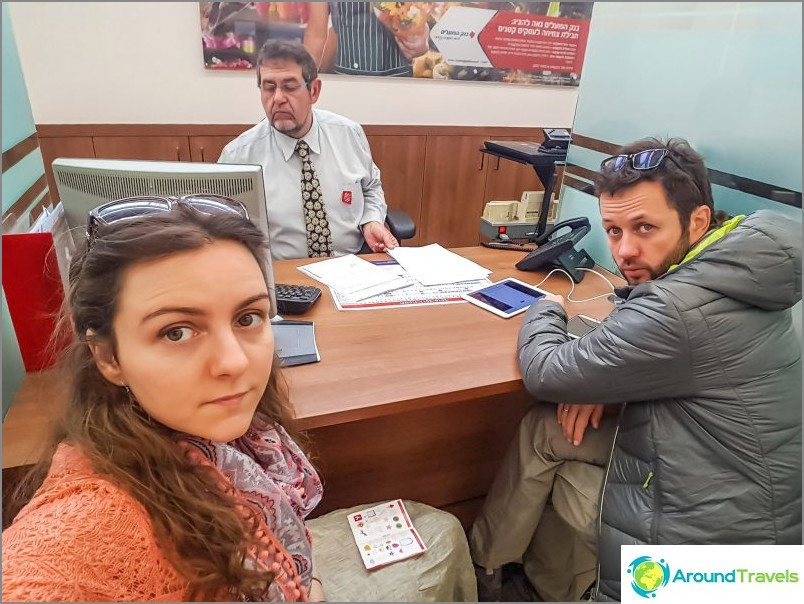
An employee at the bank scolded us for shutting up Yegor
Attitude towards people with disabilities
It's still difficult for me to say about the attitude itself, but what struck me in the very first days was that there are wheelchair users on the streets. I see them every day. Someone on an ordinary wheelchair, someone on a motorized one, there are simply pensioners on such electric scooters. This makes me happy! This means that you can move in a wheelchair and live here in general. Maybe not perfect, but you can.
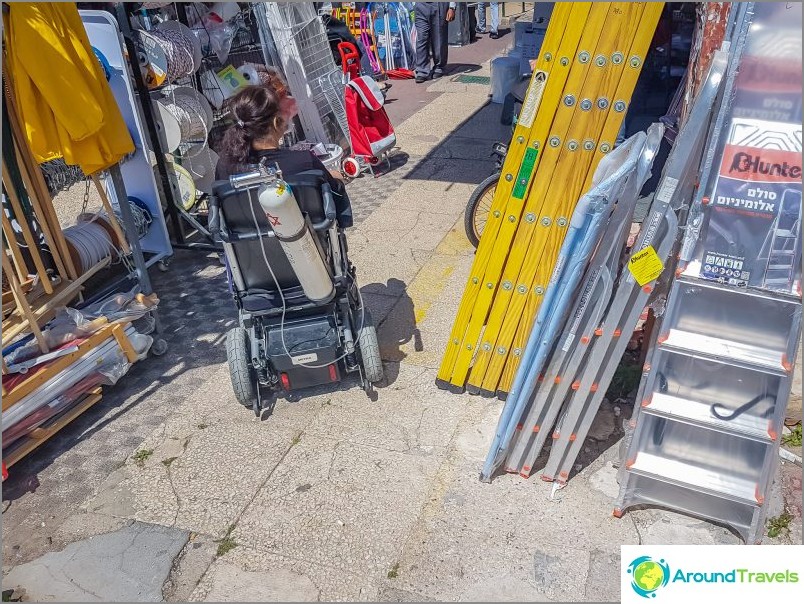
I see wheelchairs on the streets all the time
Buying a car
A lot of cars here are outwardly damaged, especially the bumpers. For some, this will be a real minus, but for me it is more likely a plus. I'm not sure yet, but it looks like the owners do not shake for every scratch. And then I remember how we have a little dash in Moscow, so run to the service to paint, after all, you need to make everything shine and sparkle. And this very trait then greatly affects the price of the car when it is sold, although it is obvious that the functionality does not depend on this, and the car is actually just a piece of hardware. I would also like to note that the mileage is not twisted here, as it is recorded in the annual technical inspection coupon..
Not everything is expensive, something is cheaper
For a SIM card with a package of 6 gigabytes and 3000 minutes / sms, I pay only 35 shekels (550 rubles). In Russia, I had a package for the same amount, but with 5 gigs and 400 minutes a month. This is to the question that not everything is as expensive as they say. With a certain approach, you can probably not increase costs too much.
Some of the products that we constantly ordered from online stores in Moscow or abroad (on iHerb) are sold here in ordinary supermarkets, and the prices are the same or even cheaper. For example, coconut oil (this is the best thing for cooking) or Quinoa, which is gluten-free and generally delicious (we got hooked on it after a trip to France).
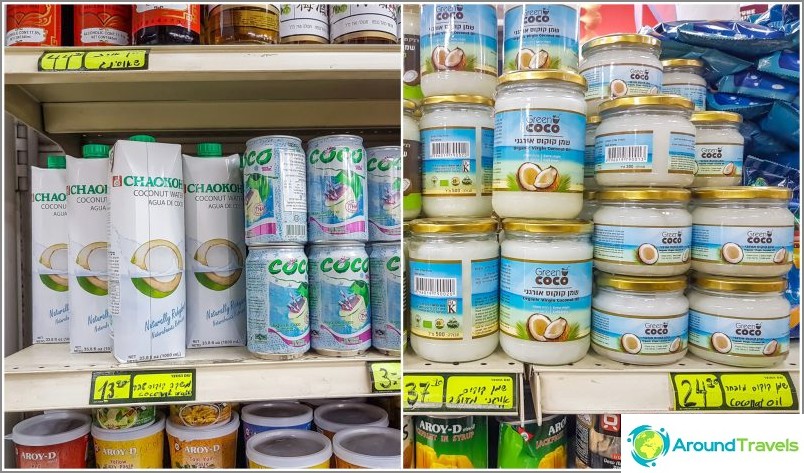
Coconut water and coconut oil, prices are the same
Tasty food
My favorite vegetable is tomato. In Moscow in supermarkets (we do not consider the ABC of taste) it is impossible to buy tomatoes with taste in winter, and sometimes even in summer. You always have to go to the market. Before leaving, I bought tomatoes in Moscow for 450 rubles / kg in a vegetable shop not far from my house. Everything else was paper-flavored biomass. So in Haifa, in any supermarket, tomatoes have a taste and cost about 6 shekels / kg (100 rubles / kg). Yes, they are not really super, like my grandmother in the village, but no worse than those that were for 450 rubles in Moscow. There are also magic cherry tomatoes for 10 shekels / pack (160 rubles) and very tasty chicken (according to Daria), as if it were a farm in Russia.
I also started eating cheese again. You know, I'm not exactly a cheesy fan, but before 2015 and the sanctions, I sometimes liked to buy myself various cheeses. And I haven't done it for a couple of years. I do not argue that somewhere in farmers' markets or special places, there may be normal cheeses, but in the usual district supermarkets near the house, and in the same Auchan, they disappeared for me. Right there in Haifa, I can again buy cheese in an ordinary supermarket 100 meters from the house, without searching. Absolutely the same situation with apples, I only eat a certain type of apples and they are here.
Accommodation with a view
In the post about the cons of Israel, I will definitely go through about the apartments, this is something with something, of course. But! When you rent an apartment in Haifa from the middle or upper price segment, then you get a pretty good option. For example, apartments that we like and that meet our requirements (nice area, new house, nice windows, elevator) receive a bonus, for example, a sea view. How much does it cost? In Moscow, with all my desire, I cannot get it, no matter how much I pay. Or the area, we are looking for an apartment of 4-5 rooms (this is 100-140 square meters), how much will an apartment of such an area cost in Moscow? Just as much, if not more, I'm afraid. In Haifa, this is 5000-7000 shekels (75-110 thousand rubles), including taxes. Expensive? Not sure. The high cost is again a relative thing. It depends on what level of housing you are interested in.
I'll write another separate item. I don’t know about the others, but for me it’s a huge plus. In Israel, the kitchen is often combined with the living room! When I was looking for an apartment in Moscow, I saw very few such apartments for rent. And I just do not digest separate small kitchens, it's so inconvenient.
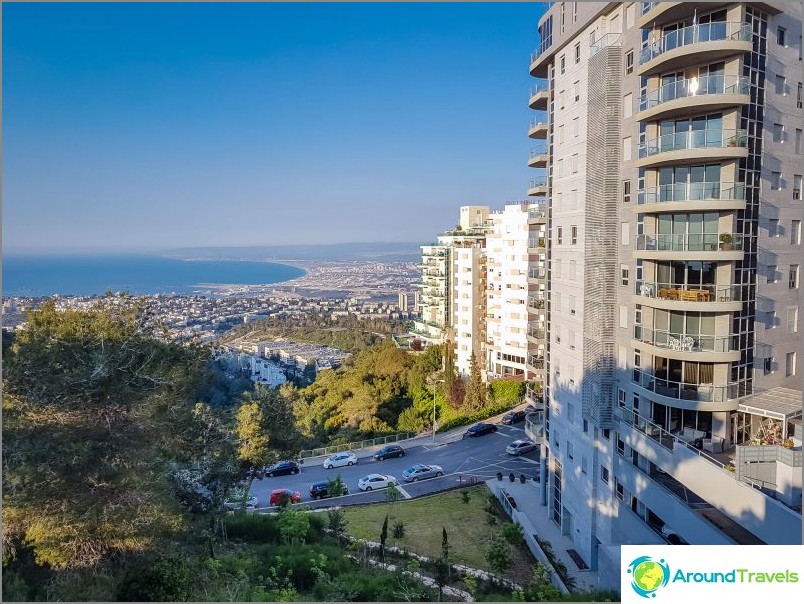
Many houses have sea views
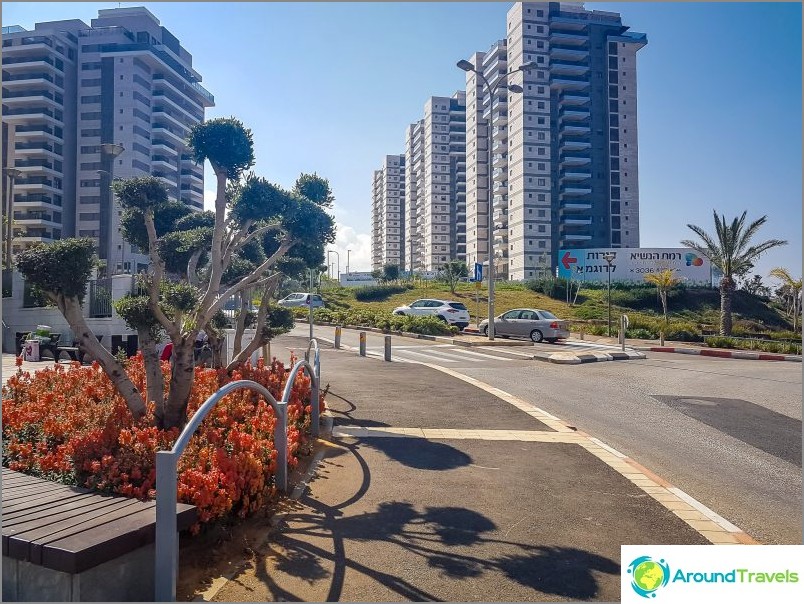
An area with nice houses and apartments also looks good
Warm climate
Climate. He's kind, yes. For an amateur, yes. But for some reason the phrase stuck in my memory that Israel has 9 months of heat and, they say, it is very difficult to live there. Perhaps the author of this phrase has lived all his life in the Arctic Circle, and I, who has been running away from winter in recent years, really like it here. Considering that now in April it is still cool for me, because it is only 18-20 degrees outside. Thus, there can be no 9 months of heat..
Judging by the temperature charts, it is hot in Haifa only from June to October (5 months), and very hot only in August, when the thermometer often stays above 30 degrees. The fact is that I have lived in Thailand for a total of 2 years and I know what a temperature of 30-32 degrees and high humidity are. And I personally tolerate such a climate normally. Only in Israel will I have a whole six months from November to April, when I can completely rest from this heat and miss it again. Of course, the winter months are not ice at all here, because there is no central heating, but! Returning to the point about housing, if you have normal windows, a good house, you do not save on heating with air conditioners, then winter will be well tolerated, given that the street will be 10-15 degrees plus, not minus.
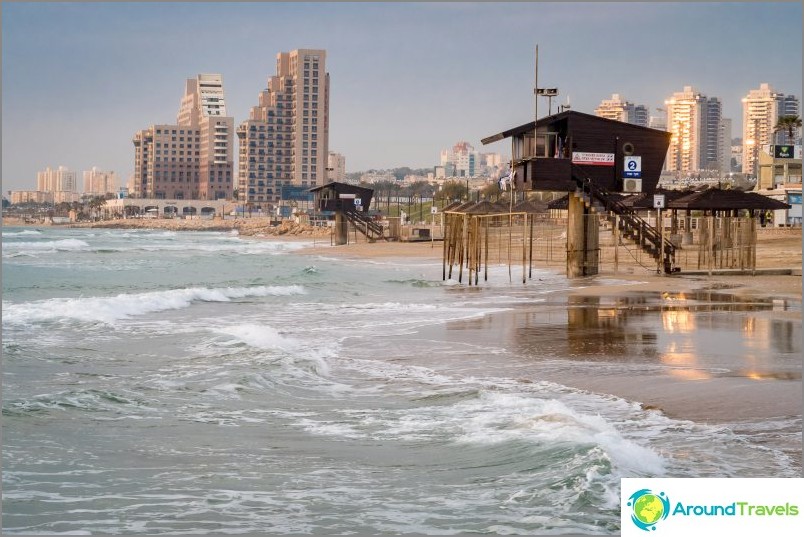
Do not forget that there is a sea in Israel, this is also a plus!
Public toilets
It seems to me that in Russia, even in Moscow, there is a whole problem with public toilets. Here they are, do you know where? In supermarkets and banks. There are also coolers with water in banks. So, when Yegor and I went to the security guard in the store, to ask about the toilet, he did not even immediately understand the question, apparently in his picture of the world it does not happen that there is no toilet in the supermarket. And he is not crap, if anything, but very decent. Also, toilets were met on the beach, in authorities, in clinics, on the street. All toilets are free.
Sidewalks, ramps and a convenient metronite
In principle, after Russia, you will not notice anything special, there are also sidewalks everywhere, but after Thailand (after all, my blog is about Thailand), it's just very cool here. In Thailand, there is a whole problem to walk somewhere along the street with an ordinary baby stroller, not to mention a wheelchair, and it is better not to walk there without a stroller. Here in Haifa, everything is about the same as in Russia, plus or minus. There are various ramps for strollers, almost any store can be entered without problems, since there are no thresholds, and often large stores have elevators if the store is two-story.
Each bus has a place for a stroller where you can put it and fasten it with a belt. Further more. When you enter the bus, you can ask him to lower himself and he drops almost to the ground (apparently, air suspension). And in order for a disabled person to call in a wheelchair, a special bridge is thrown onto the sidewalk. I remember something similar in Poland when we lived there. And there is also such a convenient thing as metronit - a bus with a dedicated lane, it is generally very convenient to enter it with a sidecar. One of the reasons why we settled in our area in Haifa is the proximity of the metronite stop.
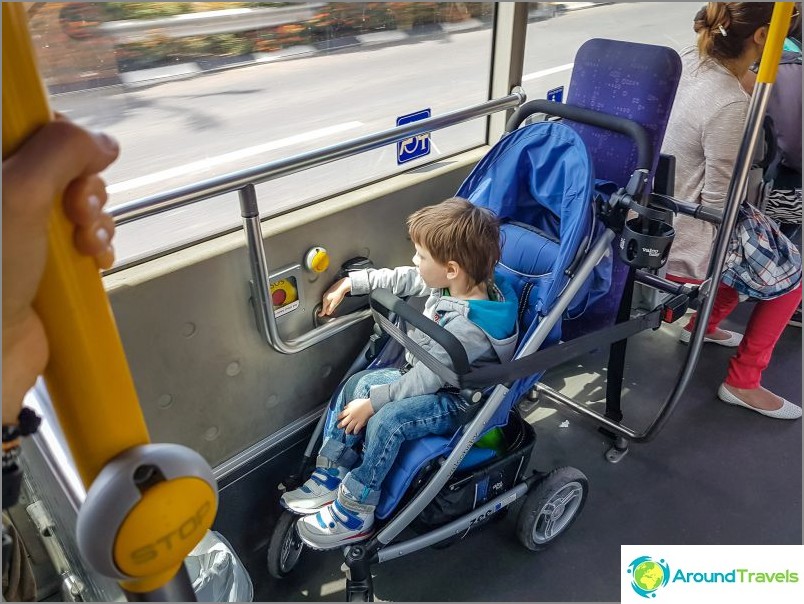
Taking a bus around Haifa
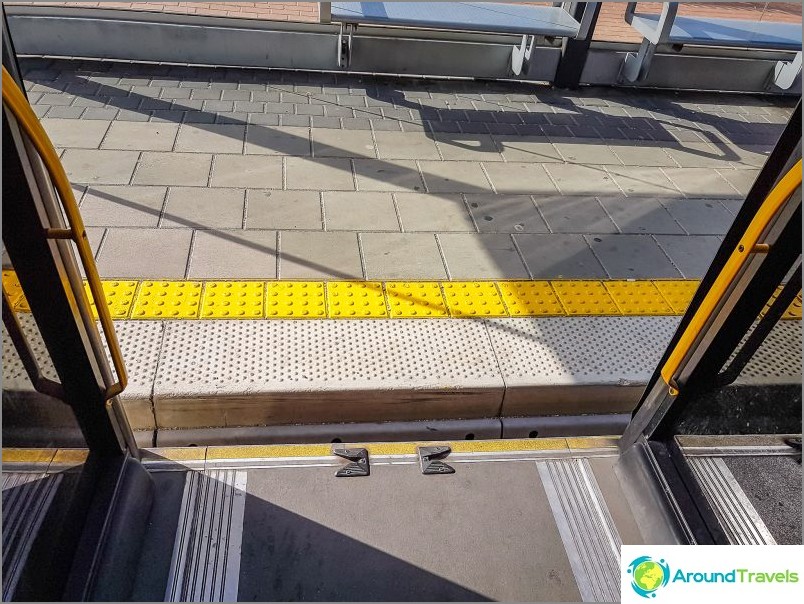
The entrance / exit from the metronite is very convenient, at the same level
Russian language everywhere
Almost everywhere you can meet someone who speaks Russian or English. I mean, different instances or the same stores. At first, it is more than enough to know English at a primitive level, because if a person does not speak Russian, then most likely he will speak English. While it is difficult to say who is more common, a small sample is too small, but for some reason, Russian speakers are more often found. Also, in some call centers (for example, the Internet provider Hot, the Maccabi health insurance fund, the Hapoalim bank) they also speak Russian.
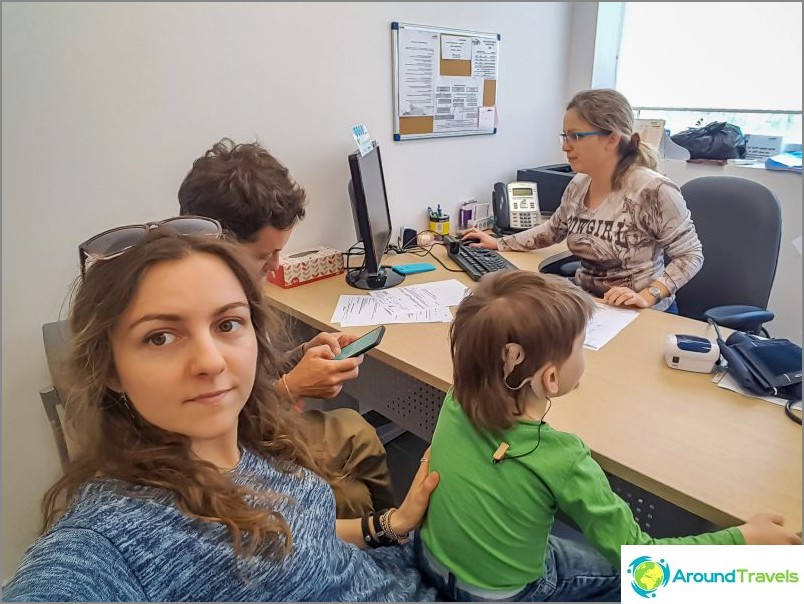
Reception at the clinic - Russian-speaking doctor
In some instances, the main plates (opening hours, floor locations, etc.) may be indicated in Russian. On the streets there are Russian signs and there are generally straight Russian shops.
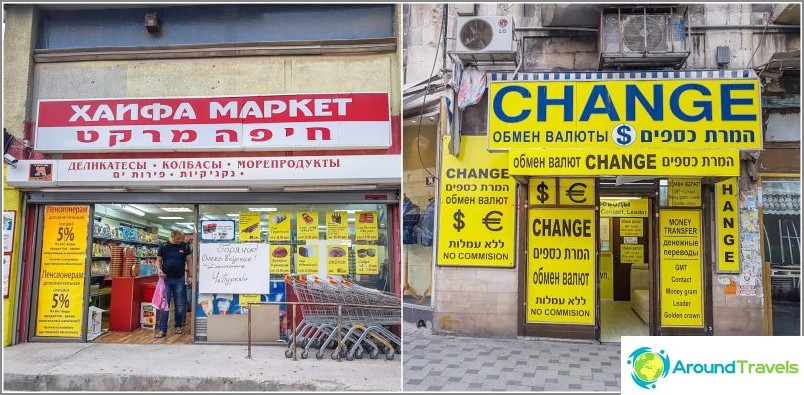
Signboards in Russian
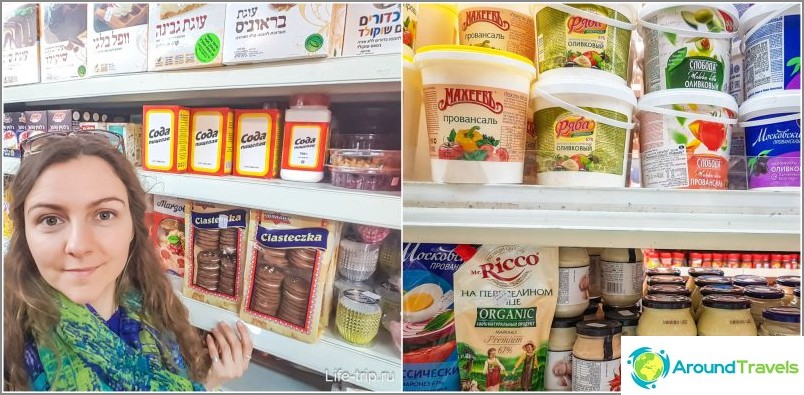
Russian products
People help
We were afraid that the new repatriates were looked down upon, that they did not want to help them and were almost trolled. Like, it was difficult for us, and you, too, should take a sip of shit. But our reality turned out to be completely different, almost every day we meet amazing participation. People are really trying to help, someone with a word, someone with a deed. And more often it is the deed. Completely strangers! And everyone without exception congratulates on the move when they find out that we have just arrived (in a store, on the street).
For example, I asked a question on Facebook in the Haifa group regarding housing, and several people immediately wrote to me in PM with specific advice, left their phones so that you could call and ask everything about paperwork, contracts, etc. And a couple of people offered to directly take and translate the lease from Hebrew into Russian and explain all the points. This is the work of a lawyer, for a minute, which costs money, and the person did it in the end for free. Another person took us on a tour of the area, taking his time on a day off. The owner of our daily apartment helped us carry our suitcases to the second floor and then offered help in finding housing and in general tried to help us in every possible way. They helped us to move our suitcases from one apartment to another, they took us to the store so that we could buy the most basic things, took the handle and showed us how to use the vending machines for public transport, helped fill out medical questionnaires in Hebrew.
P.S. Please note that these are the first impressions. Impressions from a person who has never been to Israel. Anything to add? 🙂
